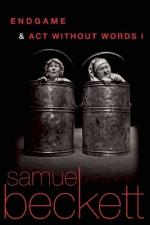|
This section contains 2,570 words (approx. 9 pages at 300 words per page) |

|
The terminal world of Beckett's Endgame, with its "corpsed" aspect outside the stage-refuge and its barbed play inside, sustains life solely, it seems, by reason of its ruler's procrastination. "Enough, it's time it ended, in the refuge too," proclaims Hamm at the outset. "And yet I hesitate, I hesitate to … to end." His hesitation is a problem not least because of "that hatred of nature as process (birth and copulation and death) which runs through the whole play" Ronald Gaskell, Drama and Reality, 1972. For if Hamm's hesitation necessitatesa prolongation of life in the refuge, the processes of nature, in one form or another, are surely unavoidable.
There is one course of action open to Hamm which offers perpetuation of life without direct involvement in the processes of nature: adoption. Indeed, this seems to be a vital means of continuation for the (now) refuge-dynasty. The legless, ashbin-bound Nagg and...
|
This section contains 2,570 words (approx. 9 pages at 300 words per page) |

|


